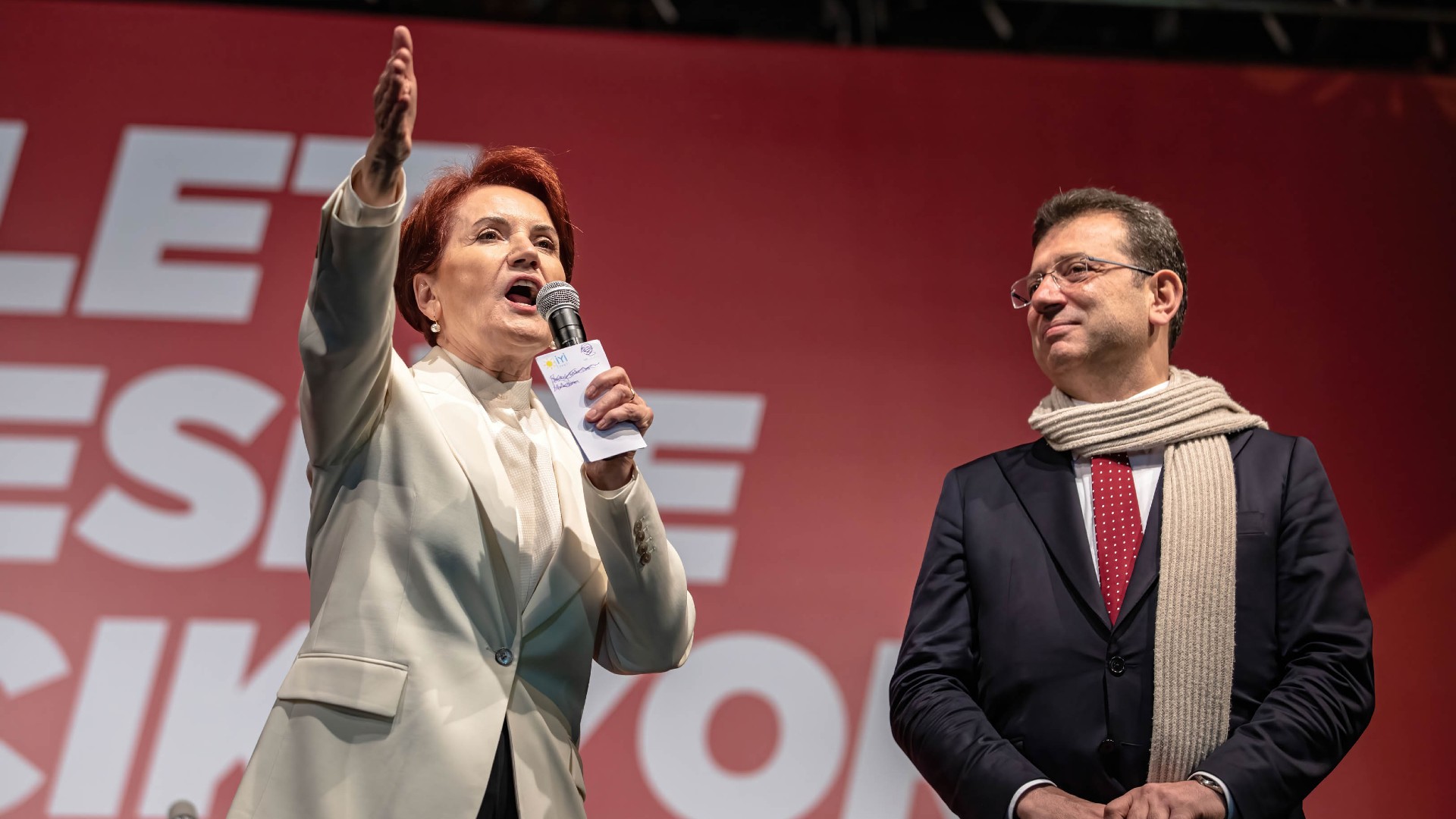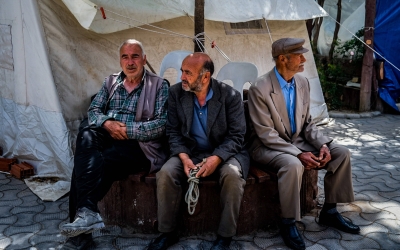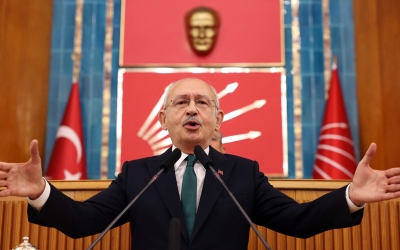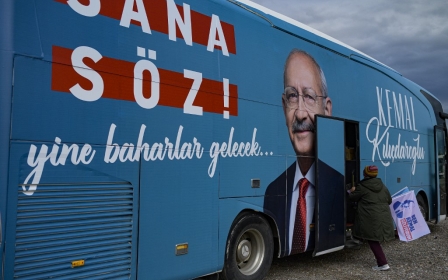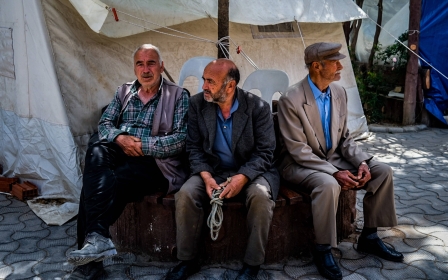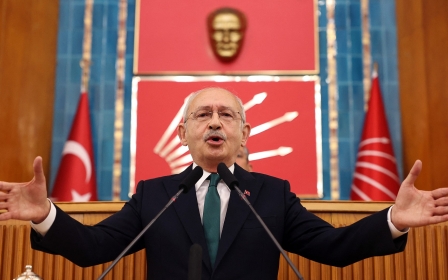Turkey elections: Can the opposition stay together if they win?
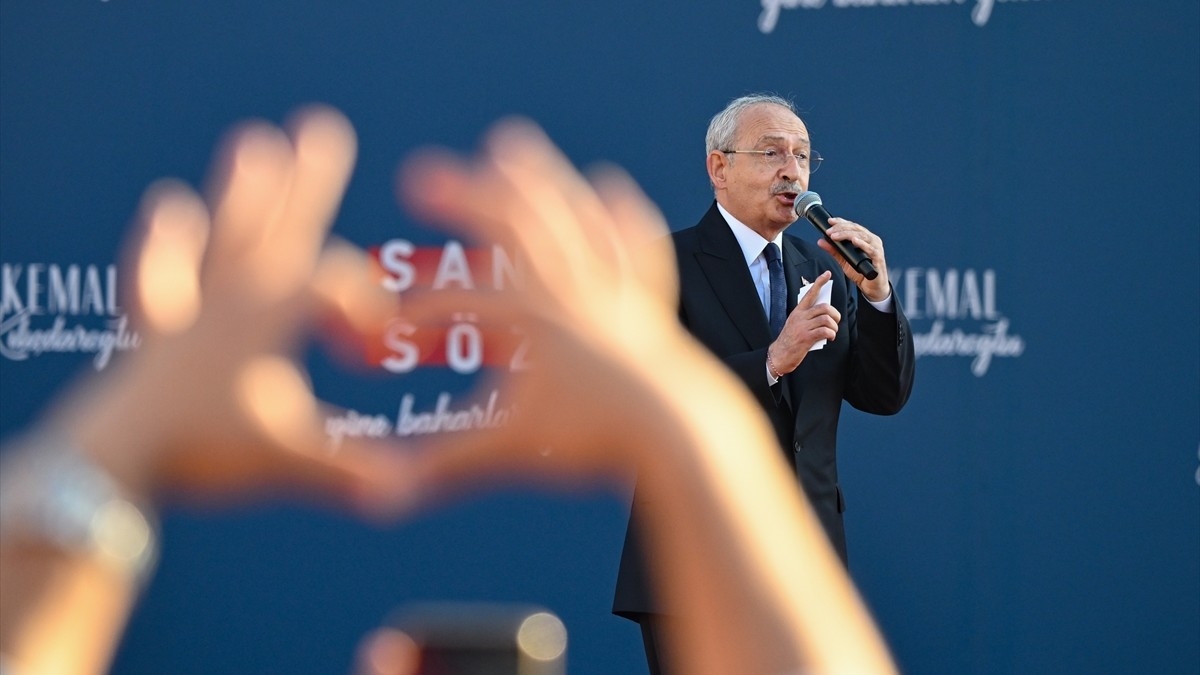
As Turkey approaches its 14 May elections, an opposition victory is increasingly plausible.
But international investors and foreign diplomats are fixated on one major concern: Would the so-called Table of Six opposition coalition stay united after capturing the presidency?
It is an unlikely alliance, to say the least. You have nationalists sitting with Islamists, secular liberals side-by-side with social conservatives, and politicians who have always fought the ruling Justice and Development Party (AKP) alongside former ministers in Erdogan’s previous government.
Big parties would have to share power with parties that struggle to get one percent of the vote.
Their alliance is held together by a president they all hate. Their programme is stitched together in a 234-page book, the Memorandum of Understanding on Common Policies, an opposition bible covering everything from the economy to foreign policy to the environment.
New MEE newsletter: Jerusalem Dispatch
Sign up to get the latest insights and analysis on Israel-Palestine, alongside Turkey Unpacked and other MEE newsletters
Ibrahim Canakci, Deva party deputy chairman, taps it, picks it up, and puts it down frequently. He says any dispute within the opposition could be resolved by going over the memorandum’s extensive text.
“We have written agreements that we have already announced to the public,” Canakci told Middle East Eye. “We have declared to the public our intention to transform Turkey’s current presidential system into a strengthened parliamentary system and we have agreed on the concrete elements.”
Gentleman's agreement
When speaking to MEE, Canakci time and again referred back to the memorandum to respond to policy questions, explaining that there is a framework to address disputes with the other parties, including a protocol that makes sure every party in the coalition gets its fair share.
The protocol suggests each political party would be represented in the cabinet by at least one minister, and their appointment or sacking by the president would be done in agreement with that party’s leader.
It also says the president would get a sign-off from all the parties' leaders when making a senior appointment.
But that is certainly not the way politics has worked in Turkey under any administration in its history. Can we expect it to work now? Is a gentleman’s agreement really enough?
One of the signatories has already walked away once before.
Meral Aksener, the chairman of Turkish nationalist Good Party (IYI), briefly broke up with the coalition in March, metaphorically smashing the "Table" in anger and opposing Kemal Kilicdaroglu’s joint candidacy for the presidential elections.
After a tense few hours, Aksener came back to the fold. But there have been other cracks.
The coalition hasn’t been able to pledge to rejoin the Istanbul Convention against violence towards women and girls, because one of its leaders, Islamist Felicity Party chairman Temel Karamollaoglu, believes it undermines family values and promotes the LGBTQ community.
Another flashpoint has been the harsh criticisim of the AKP’s economic policies over the past two decades that has been meted out by Bilge Yilmaz, a senior IYI official who is tipped to become economy minister.
Yet the AKP may not be his real target. Instead, his ire is likely directed towards another man around the opposition “Table”: Ali Babacan.
The chairman of the Democracy and Progress Party (Deva) and Erdogan’s former deputy prime minister was the man behind many of the economic policies now targeted by Yilmaz.
Yilmaz denies having Babacan in his sights, but he continues to chip away at his credentials.
Karamollaoglu has also had his gripes with Babacan. The Felicity Party leader unsuccessfully attempted to convince Babacan’s Deva to run under his own party‘s ticket, arguing it would gain more seats in the parliament.
During a TV interview last month, Karamollaoglu angrily accused Deva of failing to lure liberal conservative urban voters away from Erdogan. “They couldn’t even properly steal votes from the AK Party,” he said.
Karamollaoglu added that he found it really strange that Deva, a new party that was founded in 2019, asked the much-experienced Felicity Party to run under its own ticket.
In the end, they will both run under the slate of Kilicdaroglu’s Republican People's Party (CHP).
Despite the Memorandum’s protocol saying top offices would be appointed following an agreement with all Table of Six parties, in early April Kilicdaroglu hinted to the public that he would give ministerial positions to two top CHP figures: the energy ministry to Ahmet Akin and justice ministry to Muharrem Erkek.
Notably, he hasn’t suggested it since, likely aware of possible fallout among his partners in other parties.
Municipal elections ahead
However strong the disputes, there is a powerful political incentive to hold this coalition together at least for another year if it were to secure the presidency, and possibly also the parliament.
A senior Turkish opposition official, speaking on condition of anonymity, told MEE: “There are two echelons in this election period: presidential elections, parliamentary elections, and finally municipal elections, which are scheduled for next year.
“Everyone would want to capture more metropolitan cities to establish a good harmony between local and the central governments. We already control 11 out of 16 of those cities,” they added.
'Everyone would want to capture more metropolitan cities to establish a good harmony between local and the central governments'
- Opposition official
The official said capturing a majority in parliament would be a good boost to the opposition's morale as it would allow them to work on the changes they would like to make in the political system, including transforming Turkey back to a parliamentary system from a presidential one.
“We will prioritise domestic politics, resolving judicial and governing issues to re-establish the rule of law, checks, and balances, and separation of powers,” the official added.
But what if the opposition cannot take a majority in parliament but has won the presidency? How would they govern?
"Then we would be forced to use only things we have: presidential decrees,” the official said.
The irony is not lost on this official. An opposition hell-bent on reducing the powers of an overreaching president and restoring parliament - both of which would involve constitutional change - would have to rule at least in the short term by using the full powers of the presidency. Erdogan’s inheritance would remain.
Opposition sources call this a “transition”. But how many times in the Middle East has the temporary become permanent?
Disagreements
Foreign investors, meanwhile, are more concerned by the possible inconsistencies and disagreements among the opposition over monetary and economic policies.
Kilicdaroglu this week said that he would reveal his economics team before the elections. Some say it might be on Sunday when he holds a massive rally in Istanbul.
'I’m afraid that the disunity will prevent us from doing the tasks we promised to do. We will try our best but we are aware of the pot holes'
- opposition official
But the economy might end up being the issue the opposition has the least trouble over, there are many former high-ranking bureaucrats, economists, bankers, and policymakers in the coalition.
And there would be numerous senior economic positions to be filled, from the governor of the central bank to ministries to regulatory bodies, public banks, and financial institutes.
If that would be relatively straightforward, picking names for cabinet positions could prove tricky, especially for the interior ministry and justice ministry.
Traditionally, Turkish nationalists have always had a strong presence in these ministries and the security sector. But Erdogan’s alliance with the Nationalist Movement Party (MHP) since 2016 has emboldened and cemented the nationalists' reach.
And there are concerns that if the IYI nationalist opposition party gets either of these ministries, there would be no genuine reform since the party is a breakaway from the MHP and shares the same state-oriented look.
To avoid that, the CHP might need to sacrifice an important position, like the foreign ministry, to accommodate the IYI.
A second senior Turkish opposition official had a more pessimistic view than his colleague, saying it is likely that there would be a huge potential for discord if the opposition was victorious.
“I’m afraid that the disunity will prevent us from doing the tasks we promised to do,” the official told MEE. “We will try our best but we are aware of the pot holes.”
Some Ankara observers believe Aksener’s decision to briefly leave the Table of Six coalition was very telling for the general overview of the opposition, indicating that they might not run a coherent government.
CHP deputy chairman Oguz Kaan Salici doesn’t agree with that notion.
“Aksener left the table due to her certain concerns and everything happened in the public view, nothing was hidden,” he said during a news conference with foreign journalists last week. “She came back as at least some of her concerns were eliminated. Now, we are even stronger.”
Aksener had wanted popular Istanbul and Ankara mayors Ekrem Imamoglu and Mansur Yavas to run for the presidency instead of Kilicdaroglu.
In the end, Kilicdaroglu agreed to Aksener’s proposal to give them vice presidential positions if he wins.
Some believe Imamoglu and Yavas have increased Kilicdaroglu’s popularity by being part of his campaign as they are able to connect with wide audiences.
Salici claims that there is no problem within the alliance anymore. “Also, people have seen how successful we are running the municipalities we won in 2019,” he said.
The opposition is quite aware of the questions over its unity. This is why the massive opposition rally in Izmir on Sunday was an important opportunity.
All six opposition leaders along with the two mayors and their spouses together made an appearance on stage for the first time on the campaign trail, making a heart symbol with their hands.
Still, the underlying tensions remain. Images of Kilicdaroglu have until recently been strangely absent from campaign videos by Imamoglu and Yavas. Everyone appears to be thinking one step ahead.
Middle East Eye delivers independent and unrivalled coverage and analysis of the Middle East, North Africa and beyond. To learn more about republishing this content and the associated fees, please fill out this form. More about MEE can be found here.


